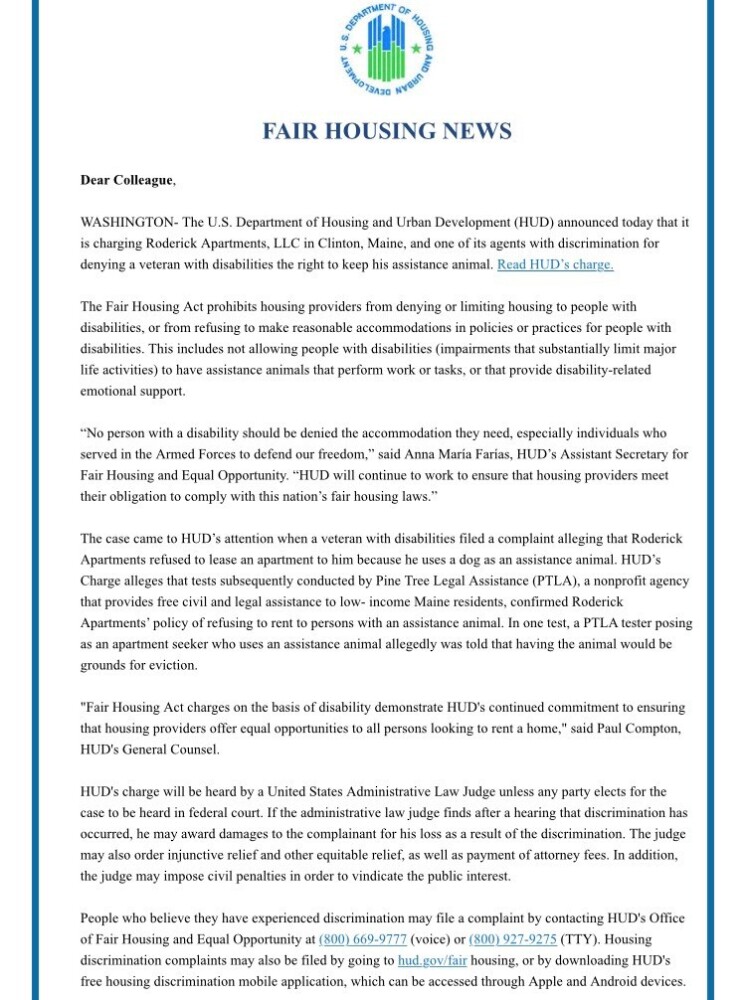CLINTON — An apartment company based in Clinton has been charged with discrimination by federal housing officials for allegedly denying a disabled veteran housing because he used an assistance animal.
The U.S. Department of Housing and Urban Development released a statement announcing that after completing an investigation, Roderick Apartments LLC and its owner, Jo Roderick, would be charged formally for violating the terms of the Fair Housing Act.
The veteran who filed the complaint, whose name has been withheld from the official grievance, alleges that in late February 2018, he and his social worker contacted Jo Roderick about renting one of the company’s units, located at 507 Hinckley Road in Clinton.
The complainant, who declined to be interviewed by the Morning Sentinel, expressed interest in moving forward in the rental process but alleges that he was shot down for eligibility by Roderick once he disclosed to her that he uses a service dog to aid him in socializing and sleeping.
According to the complainant’s legal representation at the nonprofit organization, Pine Tree Legal Assistance, Roderick also expressed interest in allowing the complainant to file a rental application but immediately stopped the process once she learned he needed an assistance animal.
“Roderick spoke to my client and said ‘absolutely not,'” Pine Tree Legal attorney Patricia Ender said. “She told him no flat-out and said he couldn’t have his service dog because other tenants who had pets in the past had caused damage.”
A service animal differs from domestic animals in that they fall under a different legal classification. Because service animals provide a service to a disabled individual, they’re protected under the Fair Housing Act and make it so housing providers are prohibited from rejecting or limiting housing to such people.
Roderick Apartments LLC has no official phone number listed online or in the phone book. The company has no office address listed and, according to Clinton police, Roderick and her husband conduct business from their home.
The company owns about 36 units on Hinckley Road and Roderick Road in Clinton.
On July 26, 2018, Pine Tree Legal conducted its own test to confirm whether Roderick had violated the terms of the Fair Housing Act by denying the complainant the ability to rent because of his service animal. They sent in an undercover person to call and inquire about the company’s policy on service animals.
In an audio recording, which Pine Tree Legal claims to have in its possession, Roderick allegedly tells the test caller that the person would not be able to occupy one of the company’s apartments with a service animal and having one on the premises would be grounds for eviction. Pine Tree Legal stated that this response is similar to the one its complainant had received from Roderick.
After Pine Tree Legal confirmed Roderick’s violation of the Fair Housing Act, the company filed a complaint in September 2018 with the U.S. Department of Housing and Urban Development on behalf of the complainant.
HUD conducted an investigation of its own and, according to Rhonda Siciliano, regional public affairs officer for the HUD New England Region, found viable evidence in the case against Roderick.
“HUD investigated the claims and defenses. … HUD found reasonable cause to believe the respondent violated the Fair Housing Act by refusing complainant’s reasonable accommodation to waive the rule against dogs,” Siciliano said. “Testing evidence supported complainant’s version that Roderick refused to waive her rule against allowing dogs at her rental properties. She’s recorded saying she won’t allow dogs as a reasonable accommodation at her properties.”
In HUD’s document relaying the charges, it alleges the complainant suffered damages because of Roderick’s violations of the Fair Housing Act.
“He was having a really hard time before this happened,” Ender said. “He was homeless before he was assisted by a social worker and found Roderick apartments; but because of this, he continued to be homeless until he finally moved down to Biddeford.”
Jo Roderick has sought the help of attorney Neil Weinstein, who claimed that his client has been wronged in the case.
Weinstein stated that Jo Roderick never would reject a tenant who needed a service animal, because she herself uses one. When asked if Roderick would like to comment, Weinstein declined on her behalf, stating his client is too upset about the situation to speak.
“There’s been some indication that HUD is charging the wrong person,” Weinstein said. “Roderick Apartments LLC came from the Roderick family, so a number of siblings were given the apartments, including my client; but the addresses HUD describes in their case don’t coincide with my client’s properties. The complainant never even filed a rental application for the property.”
But Dylan Maeby, another attorney from Pine Tree Legal working on the complainants case, refutes the claims that HUD charged the wrong person.
“We brought this claim against Jo because she was the one that my client spoke with on multiple occasions about renting the apartment. It seems unlikely that Jo would be renting out an apartment that was totally unrelated to her and her business,” Maeby said. “HUD looked into this claim and determined that is was untrue. Had they agreed, there would be no charge of discrimination against her.”
“As to the fact that my client never filled out an application,” Maeby continued, “this is a common excuse I have heard in housing discrimination cases. My client spoke with Jo about renting the apartment and both sides expressed interest in moving forward. In a follow-up call, before my client had an opportunity to complete an application, Jo expressed to him that he would not be allowed to have his support animal in the apartment. Just because he did not complete an application does not mean he wasn’t denied the apartment for discriminatory reasons. Not giving someone the opportunity to apply is just as wrong as denying an application.”
According to Ender, of Pine Tree Legal, an attempt at reconciliation between the complainant and Roderick failed. The next step is for Maeby to decide whether he wants to keep the case in front of an administrative law judge in Kennebec County or push it through to the federal district courts in either Bangor or Portland. Ender believes Maeby will keep the case in Kennebec County.
The goal of HUD’s case against Roderick is to declare that she performed discriminatory housing practices; demand she and any employees, successors or active participants in the company abstain from discriminating on the basis of a disability in any aspect of the purchase or rental of a home from here on out; award the complainant with monetary compensation for the damages caused by Roderick’s violation of the Fair Housing Act; award a civil penalty against Roderick for each violation of the act; and award any additional relief that may be specified under the act.
Send questions/comments to the editors.





Comments are no longer available on this story